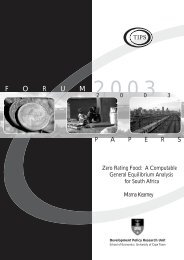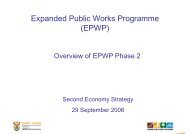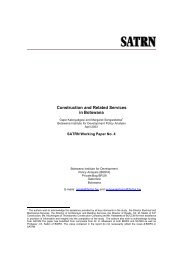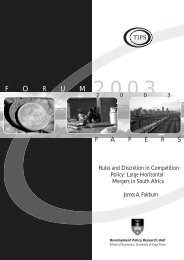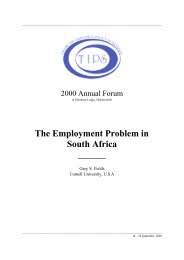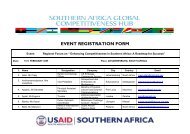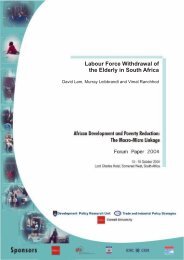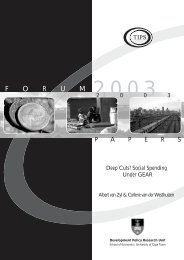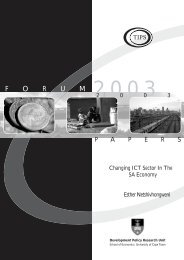3 small business policies in south africa india and brazil pg20 - tips
3 small business policies in south africa india and brazil pg20 - tips
3 small business policies in south africa india and brazil pg20 - tips
Create successful ePaper yourself
Turn your PDF publications into a flip-book with our unique Google optimized e-Paper software.
How South Africa can boost support to <strong>small</strong> <strong>bus<strong>in</strong>ess</strong>es: Lessons from Brazil <strong>and</strong> IndiaEconomic Empowerment (BEE) codes of good conduct. 30The BEE codes, which came <strong>in</strong>to effect <strong>in</strong> 2008, award po<strong>in</strong>ts to <strong>bus<strong>in</strong>ess</strong>es, based on seven elements,namely the percentage of black ownership, black management, black staff, black staff tra<strong>in</strong>ed,procurement from black suppliers, <strong>bus<strong>in</strong>ess</strong> or f<strong>in</strong>ancial assistance to black <strong>small</strong> <strong>bus<strong>in</strong>ess</strong>es, corporatesocial <strong>in</strong>vestment. Under the BEE codes <strong>bus<strong>in</strong>ess</strong>es with an annual turnover of above R35 million canscore 15 po<strong>in</strong>ts on the BEE scorecard if they spend 3% of their net profit on Enterprise Development. Forthose <strong>bus<strong>in</strong>ess</strong> with a annual turnovers of R35 million <strong>and</strong> below, the target is 2% of net profit 31 .Yet to date there has been no study carried out on the impact BEE or preferential procurement has hadon <strong>small</strong> <strong>bus<strong>in</strong>ess</strong> promotion. Presently the South African government hopes that large <strong>and</strong> medium firmswill step <strong>in</strong> to assist <strong>small</strong> <strong>bus<strong>in</strong>ess</strong>es by adopt<strong>in</strong>g enterprise development as a means to score BEEpo<strong>in</strong>ts. While this would go some way to exp<strong>and</strong><strong>in</strong>g support <strong>and</strong> f<strong>in</strong>ance for <strong>small</strong> <strong>bus<strong>in</strong>ess</strong>es, the BEEcodes’ strong emphasis on black ownership has <strong>in</strong>advertently created a rent-seek<strong>in</strong>g behaviour amongwealthy or skilled black <strong>bus<strong>in</strong>ess</strong> people, <strong>in</strong> effect curb<strong>in</strong>g entrepreneurship among this group. 32Instead of us<strong>in</strong>g their skills or capital to start their own <strong>bus<strong>in</strong>ess</strong>es, many have <strong>in</strong>stead chosen to buy <strong>in</strong>toexist<strong>in</strong>g large, often listed, companies. Black ownership may only form one of seven codes on the BEEcodes of good conduct, but it is often perceived by companies to be the quickest <strong>and</strong> most visible way totransform. Companies with high BEE scores can w<strong>in</strong> <strong>bus<strong>in</strong>ess</strong> with government. Accord<strong>in</strong>g to NazeemMart<strong>in</strong>, manag<strong>in</strong>g director of <strong>small</strong> <strong>bus<strong>in</strong>ess</strong> f<strong>in</strong>ancier Bus<strong>in</strong>ess Partners, this not only acts as a deterrenceto entrepreneurship, but it means that the number of wealthier <strong>and</strong> perhaps more creative black<strong>bus<strong>in</strong>ess</strong>men are drawn away from start<strong>in</strong>g productive, <strong>in</strong>novative enterprises 33 . This has a direct effecton limit<strong>in</strong>g manufactur<strong>in</strong>g <strong>and</strong> high-growth companies, thus <strong>in</strong> effect further threaten<strong>in</strong>g to de<strong>in</strong>dustrialisethe country. BEE also threatens the tax base from grow<strong>in</strong>g, putt<strong>in</strong>g more stra<strong>in</strong> on thecountry <strong>and</strong> its already 14 million welfare recipients 34 .BUSINESS SUPPORTAccord<strong>in</strong>g to <strong>small</strong> <strong>bus<strong>in</strong>ess</strong> researchers SBP, despite numerous <strong>in</strong>itiatives over the last 15 years aimed atboth high end enterprise development, <strong>and</strong> the encouragement of micro enterprises, government supportagencies <strong>and</strong> <strong>in</strong>itiatives “have been less successful than <strong>in</strong>tended”, add<strong>in</strong>g that this could also be“<strong>in</strong>ferred from the <strong>in</strong>stitutional re-jigg<strong>in</strong>g”. SBP concludes that the impact <strong>and</strong> achievements of thegovernment’s <strong>in</strong>itiatives have “fallen disappo<strong>in</strong>t<strong>in</strong>gly short of aspirations”. The <strong>small</strong> <strong>bus<strong>in</strong>ess</strong> researchorganisation po<strong>in</strong>ts out that s<strong>in</strong>ce 2009 there has been a large-scale acknowledgement from those <strong>in</strong>sideas well as outside of the government that the significant fund<strong>in</strong>g <strong>and</strong> support <strong>in</strong>itiatives for <strong>small</strong><strong>bus<strong>in</strong>ess</strong>es have not had the desired effect <strong>in</strong> grow<strong>in</strong>g the sector. 35On top of this awareness of government support has rema<strong>in</strong>ed limited <strong>in</strong> the country: a 2007 report byCentre of Entrepreneurship at the University of Cape Town’s (UCT) Graduate School of Bus<strong>in</strong>ess revealedthat <strong>in</strong> Gauteng just 13.5% of entrepreneurs had heard of Seda <strong>and</strong> 1.3% had accessed the agency. Inthe Western Cape awareness of Seda stood at just 10%, with 0.5% hav<strong>in</strong>g visited a Seda branch there.Added to this <strong>in</strong> the recent F<strong>in</strong>Scope 2010 South Africa Small Bus<strong>in</strong>ess Survey only 3% of entrepreneursreported that they had heard of Khula, while 10% said they had heard of National Youth Development30 When it comes to sell<strong>in</strong>g to the government, the Preferential Procurement Policy Framework Act of 2000 provides that, depend<strong>in</strong>g onthe value of a government tender, 10% or 20% of the po<strong>in</strong>ts awarded to a bidder be for the percentage of ownership <strong>in</strong> the bidd<strong>in</strong>gcompany of women, blacks or disabled people. The act is presently be<strong>in</strong>g aligned with the Black Economic Empowerment (BEE) codesof good conduct, which currently only apply to <strong>bus<strong>in</strong>ess</strong>es bidd<strong>in</strong>g for work from the private sector.31 Bignews, August 2007.32 This is the view of Moeletsi Mbeki <strong>in</strong> Architects of Poverty: Why African Capitalism Needs Chang<strong>in</strong>g, Picador Africa, 2009.33 Interview with Nazeem Mart<strong>in</strong>, Bus<strong>in</strong>ess Partners, September 2010.34 Bus<strong>in</strong>ess Times, September 12, 2010.35 SBP, 2009. “Small Bus<strong>in</strong>ess Development <strong>in</strong> SA: Time to Reassess”.Page: 21 of 111



